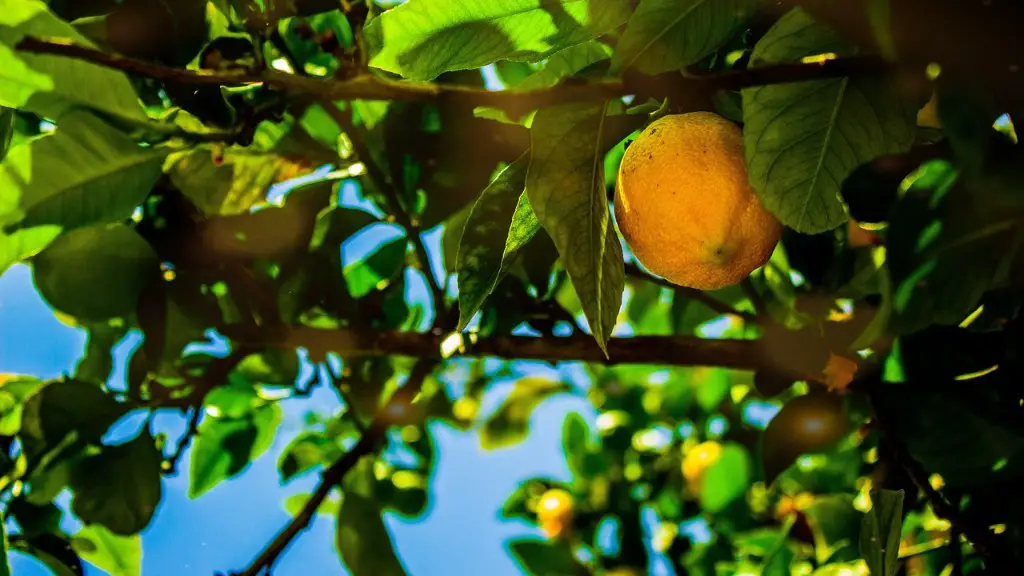The improved Meyer lemon tree is a unique and highly desirable citrus tree to have in your garden or patio. This tree offers a combination of both tart fruit and fragrant blossoms, making it a great choice for both budding gardeners and experienced horticulturalists alike. The improved Meyer lemon tree is a hybrid of a standard lemon tree and a Mandarin orange tree. It produces more tart fruit than a standard lemon tree and can provide a pleasing citrus scent throughout your home or garden.
The improved Meyer lemon tree is suitable for growing in USDA Zones 9-11 and can reach heights of up to 15 feet and widths of 10 feet. The trees are usually self-pollinating, meaning they are capable of producing fruit on their own, although they may benefit from a neighboring tree or supplemental pollination. The tree prefers full sun and can also tolerate partial shade. In addition, it requires regular pruning to keep it healthy and promote fruit production.
The fruits produced by the improved Meyer lemon tree are round and orange, with a slightly flattened shape. The skin of the fruit is quite thin, making them easy to peel and the fruit is juicy and flavorful. The ripe fruits are greener than a normal lemon fruit and the juice has a distinctive tart flavor that can be used to make pies, tarts, lemonade, vinaigrettes, marinades and dressings.
The improved Meyer lemon tree is a beautiful tree, providing a lovely contrast of dark green foliage with its fragrant white blossoms and vibrant yellow-orange fruit. The blossoms give off a wonderful scent of sweet citrus and the fruit gives off a strong tart aroma that can be used to attract bees and butterflies to your garden. The trees are also drought-tolerant and, when properly cared for, can provide years of beautiful blossoms, fragrant fruit and lovely foliage.
Caring for an improved Meyer lemon tree requires some upkeep, such as regular irrigation and pruning, but otherwise the trees are relatively easy to care for. They need to be protected from cold winter temperatures, but can tolerate occasional frosts. They will also benefit from regular fertilizing with a citrus fertilizer and protection from wind and harsh sun. With proper care, improved Meyer lemon trees can produce fruit throughout the year.
Where to Buy
Improved Meyer lemon trees can be purchased from most nurseries or can be ordered directly from specialty citrus nurseries. Trees grown in containers are usually small and slower-growing, but they can still reach full size if grown outdoors. Trees grown directly in the ground will usually produce more fruit and are usually less susceptible to diseases and pests. However, due to the delicate nature of citrus trees, it is important to purchase trees from a reputable nursery with a good track record.
Growing in Containers
Improved Meyer lemon trees can also be grown in containers, making them ideal for porches, balconies and other small spaces. The trees grow quite large and do require regular pruning, but they grow quite slowly and take up less space than those grown outdoors. Containers should be large enough to allow for root expansion and should be filled with quality potting soil and drained well. The container should be placed outside in an area that receives plenty of sunlight, and the container should be watered when the soil dries out. It is also important to fertilize regularly and remember to bring your container indoors to protect it from extreme temperatures.
Fertilizing and Pruning
Fertilizing and pruning are important steps in caring for an improved Meyer lemon tree. The tree will benefit from supplementary fertilization with a citrus fertilizer, applied approximately once per month during the growing season. Pruning should also be done regularly, to keep the tree from getting too lanky and to promote fruit production. The tree should be pruned to keep the branches open, allowing for plenty of sunlight and air circulation. It is also important to remove any dead or diseased branches to keep the tree healthy.
Citrus Diseases and Pests
Improved Meyer lemon trees can be susceptible to some diseases and pests like root rot, leaf spot and whitefly. These can be easily treated with appropriate chemicals, but it is important to keep an eye out for damage and diseases on the tree. If your tree does develop an infestation of pests or diseases, it is important to act quickly and get rid of the problem before it becomes severe.
Citrus Chilling Requirements
When grown outdoors in USDA Zones 9-11, it is important to keep in mind the citrus chilling requirements of your improved Meyer lemon tree. During a cold winter, the tree may require temperatures below 45 degrees for a certain number of hours in order to produce fruit. If your area does not have enough cold weather during the winter, you can try moving your tree indoors for a period of time.
Overall Care and Maintenance
The improved Meyer lemon tree is an attractive and productive citrus tree that is relatively easy to care for. The tree needs regular irrigation and fertilizing, as well as pruning to keep it healthy and promote fruit production. The tree can also benefit from protection from wind and direct sunlight, and should be monitored for diseases and pests. Lastly, keep in mind the citrus chilling requirements in your area and bring the tree indoors if necessary. With proper care and maintenance, your improved Meyer lemon tree can produce delicious fruit and lovely blossoms for many years to come.
